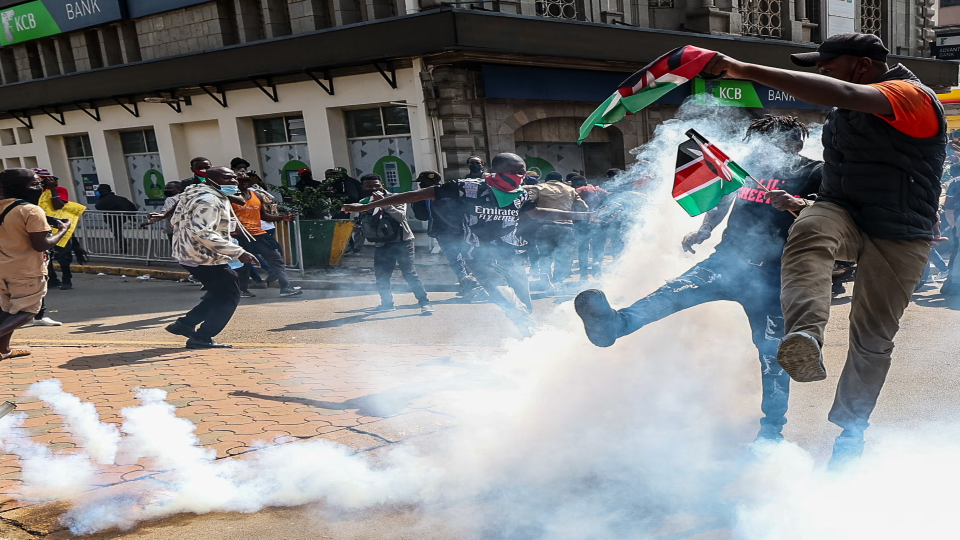Deadly Clashes Mark Anniversary of GenZ Protests
Thousands of Kenyans took to the streets across the nation on Wednesday, June 25, to commemorate the first anniversary of the 2024 anti-tax demonstrations, which saw over 60 people killed and culminated in the storming of parliament. The protests, initially sparked by opposition to a controversial finance bill, have reignited public outrage over police brutality, economic hardship, and governance issues. However, the day of remembrance turned violent, with at least 16 people killed and over 400 injured, according to human rights groups and medical sources.
Last year’s protests, led predominantly by Kenya’s Gen Z, erupted in response to proposed tax hikes in the 2024 Finance Bill, which many argued would exacerbate the country’s already dire economic situation. The demonstrations peaked on June 25, 2024, when thousands stormed Kenya’s parliament in Nairobi, setting parts of it ablaze and forcing lawmakers to flee. Rights groups, including Amnesty Kenya, estimate that at least 60 people were killed and dozens more were illegally detained by security forces during the weeks of unrest. The government eventually withdrew the tax proposals, but public anger over excessive police force and unresolved disappearances has persisted.
This year’s protests were intended to honor those killed in 2024 while renewing calls for accountability, particularly following the recent death of 31-year-old blogger Albert Ojwang in police custody. Ojwang, arrested for allegedly criticizing Deputy Police Chief Eliud Lagat, died two days later, with an autopsy revealing injuries consistent with assault, contradicting initial police claims of self-harm. His death has become a rallying point for demonstrators demanding justice and an end to police impunity.
In Nairobi’s central business district, where many businesses shuttered for the day, thousands of mostly young protesters gathered, waving Kenyan flags and holding placards bearing images of last year’s victims. Chants of “Ruto must go” echoed through the streets, directed at President William Ruto, whose administration has faced criticism for corruption, unemployment, and heavy-handed responses to dissent.
The protests began peacefully, with activists and families of victims calling for solemn remembrance. However, tensions escalated as police deployed tear gas, water cannons, rubber bullets, and live ammunition to disperse crowds. Protesters retaliated by throwing stones, setting street fires, and erecting barricades. In some areas, demonstrators clashed with groups of motorbike-riding “goons” armed with whips and clubs, widely believed to be government-aligned.
Amnesty Kenya reported that 16 people were killed, most by police, with at least five deaths attributed to gunshot wounds. The Kenya National Commission on Human Rights (KNCHR) noted over 400 injuries nationwide, including 83 requiring specialized treatment. Kenyatta National Hospital in Nairobi admitted 107 patients, most with gunshot injuries from rubber bullets and live rounds. In Mombasa, Kenya’s second-largest city, protesters displayed placards reading “Stop killing us,” while isolated clashes were reported in Kitengela, Kisii, Matuu, and Nyeri.
President Ruto, who last year withdrew the tax bill under pressure, has faced renewed calls for resignation. In response to Ojwang’s death, Ruto described it as “heartbreaking and unacceptable,” and a police constable has been arrested in connection with the case. However, Kenyan police spokesperson Muchiri Nyaga declined to comment on allegations of excessive force during Wednesday’s protests.
In a move that sparked accusations of censorship, the government ordered a media blackout, pulling channels like NTV and KTN off the air after they defied instructions to halt live broadcasts. Large crowds heading toward State House, the president’s official residence, were dispersed by security forces, and major roads to Nairobi’s business district were sealed off with barbed wire.
The Independent Policing Oversight Authority (IPOA) reported 61 arrests during the protests, while a Kenyan court has given detectives 15 days to investigate two police officers suspected of shooting a street vendor, Boniface Kariuki, during a protest last week. Kariuki, critically injured while selling masks, remains in intensive care.
Demonstrators expressed frustration over the government’s failure to address systemic issues. “We are marching against police brutality, against oppression by the government, against high taxation, everything that is going wrong in this country,” said Anthony, a 25-year-old flag vendor in Nairobi who declined to give his full name. Eve, a 24-year-old protester, told AFP, “The police are supposed to protect us, but they kill us. It’s extremely important that young people mark June 25th because they lost people who look like them, who speak like them.”
The Law Society of Kenya (LSK), Police Reforms Working Group, and Kenya Medical Association issued a joint statement urging restraint from law enforcement and calling for dialogue to resolve the political impasse. “Every Kenyan life is precious,” the statement read. “We pray for our nation and a way forward.”
Western embassies, including those of the United States, United Kingdom, and Canada, released a joint statement on X urging all parties to facilitate peaceful demonstrations and refrain from violence. The international community has expressed concern over Kenya’s escalating unrest, with last year’s protests already drawing condemnation for the use of excessive force.
Wednesday’s protests underscore the deep-seated grievances fueling Kenya’s youth-led resistance. Rising living costs, unemployment, and corruption scandals have eroded public trust in Ruto’s administration, while the heavy-handed response to dissent risks further alienating a generation already scarred by last year’s violence. As Kenya approaches the 2025 Finance Bill’s public consultation process, activists warn that preemptive arrests, such as those of Ojwang and digital activist Rose Njeri, signal a strategy of suppression aimed at stifling mobilization.
For families of the victims and survivors, the fight continues. “As much as Kenyans are trying to be peaceful, [the police] always find a way of fighting them,” said Nevnina Onyango, widow of Albert Ojwang, in an interview with the BBC. “If people air their voices in the street, things might change.”


